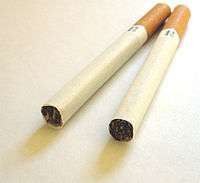Pall Mall (cigarette)
 | |
| Product type | Cigarette |
|---|---|
| Produced by |
R. J. Reynolds British American Tobacco |
| Introduced | 1899 |
| Website | pallmallusa.com |

Pall Mall (/ˌpɛlˈmɛl/, /ˌpælˈmæl/ or /ˌpɔːlˈmɔːl/) is a brand of cigarettes produced by R. J. Reynolds Tobacco Company in Winston-Salem, North Carolina, and internationally by British American Tobacco at multiple sites. As of 2012, Pall Mall is R. J. Reynolds' highest selling brand.[1]
History
The Pall Mall brand was introduced in 1899 by the Black Butler Company (UK) in an attempt to cater to the upper class with the first "premium" cigarette. It is named after Pall Mall, a well-known street in London.

In 1907, Pall Mall was acquired by American Tobacco with the sale of Butler & Butler. The new owners used the premium brand to test innovations in cigarette design, such as, in 1939, the "king-size" (now the standard size for cigarettes at 85mm, although today that includes the filter length), and a new way of stuffing tobacco that supposedly made cigarettes easier on the throat.
Pall Mall reached the height of its popularity in 1960 when it was the number one brand of cigarette in America.[2] The gambles in design had paid off and so the company introduced "longs", or 100mm cigarettes (again creating a standard, this time for long cigarettes), in 1966.[3] It would later be edged out in 1966 by Winston cigarettes, when Pall Mall found that it could no longer compete with the advertising campaign "Winston tastes good like a cigarette should." Ironically, in the 1940s, Pall Mall had its own grammatically incorrect slogan which touted it as the cigarette which "travels the smoke further", referencing the longer 85mm length. Their famous slogan during the '50s and early '60s was "OUTSTANDING...and they are MILD!".
In 1994, Pall Mall and Lucky Strike were purchased by Brown & Williamson Tobacco Corporation as the former American Tobacco company shed its tobacco brands.[4] In 2001, Pall Mall was re-branded as a savings brand, and introduced several varieties of filtered cigarettes. Brown & Williamson merged with R. J. Reynolds Tobacco Company on July 30, 2004, with the surviving company taking the name, R. J. Reynolds Tobacco Company. R. J. Reynolds continues to make unfiltered and filtered styles of Pall Mall for the U.S. market, emphasizing the latter. British American Tobacco makes and sells Pall Mall outside the U.S.
Pall Mall currently is in the "Growth Brand" segment of the R.J. Reynolds brand portfolio.[5] Within British American Tobacco, Pall Mall is one of their four drive brands.[6] During the late-2000s recession, Pall Mall was marketed as a "premium product at a sub-premium price", which pushed the product from a 1.95 percent market share with a 1.6 billion quarterly volume in 2006 to 7.95 percent and 5.5 billion in third quarter 2010. This compares with former top-seller Camel, which has not performed as well over the period, with 8 percent share and 5.6 billion.[7]
Pall Mall is now Reynolds' most popular cigarette, along with Newport and Camel. In October 2012, Reynolds debuted two new versions of its menthol cigarette, Pall Mall Black, described as "full flavor", and Pall Mall White, called "smoother". The traditional menthol style is called Pall Mall Green.[8]
Pall Mall is currently sold as a Canadian discount brand in Red (full-flavour) and Blue (light). Rothman's produces American-style Pall Mall cigarettes which are priced as a premium brand.
Logo
The famous Pall Mall logo has large art nouveau lettering spelling out "Pall Mall" on the top front of the pack. On the face is a white coat of arms on the front and back of the pack. Showing two regal lions pawing the sides and a knight's helmet on top, the inside of the shield reads "Per aspera ad Astra" or "Through hardships to the stars" (which resembles the motto of the RAF, "Per ardua ad astra", or "Through adversity to the stars"). There is a banner underneath the shield that holds another Latin phrase, "In hoc signo vinces" or "By this sign shall you conquer". The famous Pall Mall slogan, "Wherever Particular People Congregate", appears beneath the coat of arms.
Generally speaking, there are different designs for Pall Mall packs. It can be always identified on which market one or another pack of Pall Mall was bought. Nevertheless, the logo and the main features of it remain unchanging.
In 2007, R. J. Reynolds Tobacco Company changed the packaging color of Pall Mall Ultra Lights from light blue to orange to stop confusion between the Ultra Lights and the Lights. Both had been in blue colored packaging.
In 2009, R. J. Reynolds Tobacco Company changed the flavor descriptors of all the Pall Mall brand hard packs to color designations. The descriptor change occurred because the FDA banned product descriptors such as "Light," "Ultra Light" and "Mild" in 2010. Along with the change in descriptors, the rings and branding on the cigarettes have changed to match both the color of the box and the Pall Mall lettering on the filter for that particular descriptor. The soft packs are still sold with the traditional style packaging and design.
In 2015, the FDA required that two varieties of Pall Mall be removed from stores, Deep Set Recessed Filter (blue) and Deep Set Recessed Filter Menthol, as well as Camel Crush Bold and Vantage Tech 13.[9]
Current hard pack styles (USA)
- Pall Mall Red - Kings, 100's
- Pall Mall Blue - Kings, 100's
- Pall Mall Orange - Kings, 100's
- Pall Mall Menthol - Kings, 100's
- Pall Mall Menthol Black - Kings, 100's
- Pall Mall Menthol White - Kings, 100's
Current soft pack styles (USA)
- Pall Mall Non-Filter
- Pall Mall Gold 100's
Pronunciation
During the era of cigarette advertising on television and radio, the commonly accepted pronunciation of the brand was pel-ˈmel.[10] However, after the Public Health Cigarette Smoking Act banned cigarette advertising, the American pronunciation shifted to the phonetic form of pal-ˈmal. Older smokers who heard the commercials often still use the older pronunciation, as do smokers from the United Kingdom—the cigarette and the street in London are pronounced the same.
Cultural references
Kurt Vonnegut, who was a Pall Mall smoker himself, used the brand in several of his novels. He was quoted as saying that they were "a classy way to commit suicide."[11]
The brand was the sponsor of M Squad, a television program which ran on NBC during the late 1950s. Lee Marvin, the show's star, appeared on its commercials during the episodes.[12]
See also
References
- ↑ Craver, Richard (2012-09-26). "Pall Mall surpasses Camel. Reynolds to offer more menthol versions of Pall Mall cigarettes". Winston-Salem Journal.
- ↑ Wootten, Harry M. "Cigarettes up 4.8% in 1960 -- Pall Mall No. 1 for first time". Printers Ink. 23 Dec. 1960. http://www.tobaccoinstitute.com/PDF/TIMS0019564_9574.PDF
- ↑ "What We Make - R.J. Reynolds Tobacco Company". Retrieved 23 October 2016.
- ↑ Gilpin, Kenneth N. (October 9, 1996). "American Brands Ends Tobacco Role". The New York Times. Retrieved May 21, 2010.
- ↑
- ↑ "British American Tobacco - British American Tobacco". Retrieved 23 October 2016.
- ↑ Craver, Richard (2010-11-14). "Reynolds marketing push for Pall Mall puts it into same league as Camel". Winston-Salem Journal. Retrieved 2010-11-23.
- ↑ Craver, Richard (2012-09-26). "Reynolds to offer more menthol versions of Pall Mall cigarettes". Winston-Salem Journal.
- ↑ "Press Announcements - FDA issues orders that will stop further U.S. sale and distribution of four R.J. Reynolds Tobacco Company cigarette products". Retrieved 23 October 2016.
- ↑ austinstein (26 November 2007). "Pall Mall Cigarette Ad 1967". Retrieved 23 October 2016 – via YouTube.
- ↑ Barber, Lynn (February 5, 2006). "I smoke, therefore I am". London: The Guardian Observer. Retrieved 2007-04-12.
- ↑ Pall Mall Presents M Squad – Tobacco Videos.
External links
| Wikimedia Commons has media related to Pall Mall (cigarette). |

